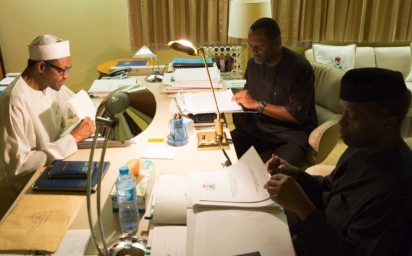Business
Buhari Has Not Seen Emergency Economic Bill – Presidency Says

The Economic Management Team has indeed been considering several policy options and measures to urgently reform and revitalize the economy, but the Presidency in a statement says bill has not been passed to President Buhari…
Statement issued by Laolu Akande, Senior Special Assistant-Media & Publicity In the Office of the Vice President reads;
“Some of these measures may well require legislative amendments and presidential orders that will enable the Executive arm of government move quickly in implementing the economic reform plans.
“As far as I know, this has not been passed on to the President, the Federal Executive Council or the Legislative arm of government. So at this point, there are no further details to share.
The Nation Newspaper had reported that, the objectives of the action-plan on the economy, which is in recession, include shoring up the value of the naira, creation of more jobs, boosting of foreign reserves, reviving the manufacturing sector and improving power.
Government sources said the decision to seek emergency powers for the President was based on a proposal from the economic team headed by Vice President Yemi Osinbajo. The team reviewed the various policies so far introduced and how they have affected the economy.
In the bill, the executive will be asking for the President to be given sweeping powers to set aside some extant laws and use executive orders to roll out an economic recovery package within the next one year.
Buhari will be seeking powers to:
abridge the procurement process to support stimulus spending on critical sectors of the economy;
make orders to favour local contractors/suppliers in contract awards;
abridge the process of sale or lease of government assets to generate revenue;
allow virement of budgetary allocation to projects that are urgent, without going back to the National Assembly.
amend certain laws, such as the Universal Basic Education Commission (UBEC) Act, so that states that cannot access their cash trapped in the accounts of the commission because they cannot meet the counterpart funding, can do so; and
to embark on radical reforms in visa issuance at Nigeria’s consular offices and on arrival in the country and to compel some agencies of government like the Corporate Affairs Commission (CAC), the National Agency for Foods Administration and Control (NAFDAC) and others to improve on their turn around operation time for the benefit of business.






